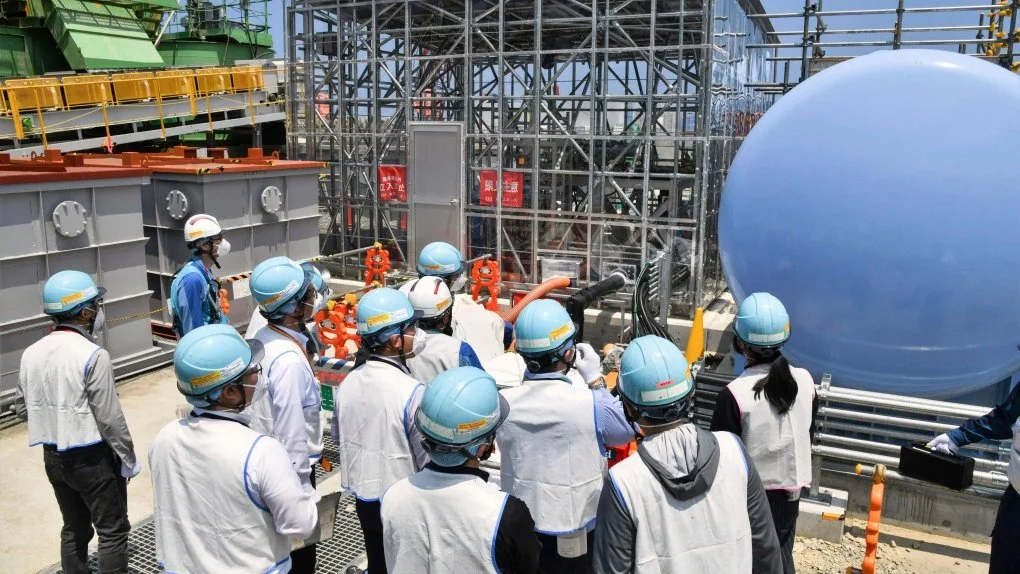Japanese regulators began the final inspection Wednesday before treated radioactive wastewater is released from the wrecked Fukushima nuclear plant into the Pacific Ocean. The inspection began a day after the plant operator Tokyo Electric Power Company Holdings had installed the last piece of equipment needed for the release -- the outlet of the undersea tunnel dug to discharge the wastewater 1 kilometer (1,094 yards) offshore.
Survey shows mixed confidence in ultimate success of Giant Mine remediation project
Some Yellowknife, Ndilǫ and Dettah residents are skeptical about the Giant Mine site being successfully remediated. That's according to a recent survey from the Giant Mine Oversight Board (GMOB). About one-third of respondents said they were either "not very confident" or "not at all confident" that the site would be successfully remediated.
Toxic 'forever chemicals’ restricted for first time in the U.S.
The Environmental Protection Agency is expected to propose restrictions on harmful “forever chemicals” in drinking water after finding they are dangerous in amounts so small as to be undetectable. But experts say removing them will cost billions, a burden that will fall hardest on small communities with few resources. Concerned about the chemicals' ability to weaken children's immune systems, the EPA said last year that PFAS could cause harm at levels “much lower than previously understood.”
So-called ‘safe’ pesticides have surprising ill effects
Health Canada is currently reviewing regulations for pesticides in Canada, and three UBC researchers say regulators might want to consider what happened in Japan. A lake in Shimane Prefecture has seen its commercial fishery collapse by more than 90 per cent since 1993, when insecticides known as neonicotinoids were first introduced to the area. It just so happens that zooplankton—the tiny creatures in the water that fish feed on—declined by 83 per cent during the same period.
Pacific islands urge Japan to delay release of Fukushima waste over contamination fears
Pacific island nations are urging Japan to delay the release of water from the destroyed Fukushima nuclear power plant over fears fisheries will be contaminated, the Pacific Island Forum (PIF) said on Wednesday. The Japanese government said last week that water from the destroyed Fukushima nuclear power plant could be released into the sea "around this spring or summer," raising concerns from island nations still grappling with the legacy of nuclear testing decades ago.
Japan estimates Fukushima water release to start in 'spring or summer'
The Japanese government gave an estimation for when the water from the destroyed Fukushima nuclear power plant will be released into the sea, saying at a cabinet meeting held on Friday it could happen sometime "around this spring or summer." In April 2021, the government approved the release of more than 1 million tonnes of irradiated water from the site after treatment into the ocean. It said the release would happen "in about two years" at the time.
Britain begins drought planning after record heatwave
Britain is enacting the early stages of drought plans which involve using water carefully to protect supplies, the government said on Tuesday, following record-breaking temperatures. There are so far no plans for curbs on water use but regulators and water companies are working to manage water levels, including by operating water transfer schemes to allow rivers to be artificially maintained, the Environment Agency (EA) said.
Japan regulators approve release of Fukushima water into sea
Japan's nuclear regulators have approved a plan to release into the ocean water from the wrecked Fukushima Dai-ichi nuclear power plant, the government said on Friday. The water, used to cool reactors in the aftermath of the 2011 nuclear disaster, is being stored in huge tanks in the plant, and amounted to more than 1.3 million tonnes by July. The regulators deemed it safe to release the water, which will still contain traces of tritium after treatment, the foreign ministry said in a statement.
Coastal GasLink Faces More Water Pollution Concerns
Coastal GasLink is facing more criticism over water-quality concerns as a result of construction on its 670-kilometre pipeline through northern B.C., this time in the western portion of the route near Kitimat. On Feb. 19, the company received an order from B.C.’s Environmental Assessment Office for allowing sediment to flow into a watercourse where its pipeline right-of-way crosses the South Hirsch Forest Service Road, just east of Kitimat. The order requiring the company to prevent sediment-laden water from entering watercourse comes days after the company was fined $72,500 for similar violations that have repeatedly been identified along the pipeline route.
Who Saved Alberta’s Mountaintops and Precious Clean Water? Albertans
After a federal-provincial review panel gave a resounding thumbs down to the Grassy Mountain coal project Thursday, Alberta Energy Minister Sonya Savage and so-called Environment Minister Jason Nixon issued a contrite statement. It is always remarkable to watch political wolves act like sheep. Both ministers, who have championed open-pit mining in the Rockies by Australian companies (Nixon even had the gall to write a letter of support for one group of speculators), said they would respect the unequivocal rejection by the Alberta Energy Regulator.
Plastic particles in drinking water present 'low' risk - WHO
Microplastics contained in drinking water pose a “low” risk to human health at current levels, but more research is needed to reassure consumers, the World Health Organization (WHO) said on Thursday.
Studies over the past year on plastic particles detected in tap and bottled water have sparked public concerns but the limited data appears reassuring, the U.N. agency said its first report on potential health risks associated with ingestion.












